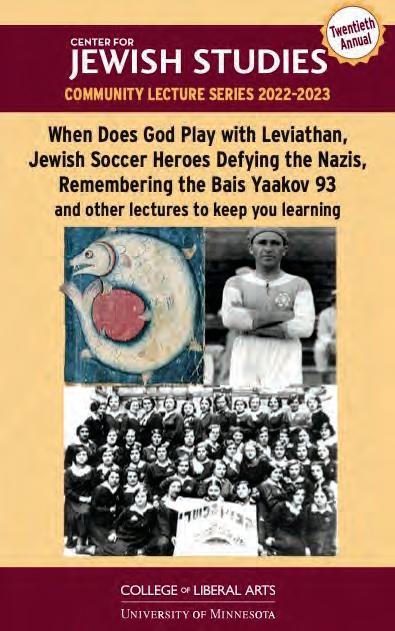
3 minute read
Fostering an Inclusive Campus
The Center for Jewish Studies exists “to foster a new understanding of Jewish culture and history.” Recent years have made it clear that on this campus and most others, a more accurate understanding within the broader community of Jewish identity, experience, culture, and history is urgently needed in the interest of a more equitable and inclusive campus. And so the CJS has committed resources and expertise, as part of its educational mission and commitment to deepening ties with the University, to addressing misrepresentations or erasures of Jewish identity, experience, and history, including within multicultural and Diversity, Equity, and Inclusion (DEI) initiatives. In addition to hosting a two-day Symposium, “Antisemitism and Racism in a Moment of Reckoning” (see p. 3), the CJS has worked with the Gopher Equity Project (Office of Undergraduate Education) to update the Project to include faculty-vetted resources about the Jewish experience and about antisemitism, and we have similarly worked with the UMN Office of Equity and Diversity to update their educational materials. Such initiatives, and this is broadly true and not just on this campus, routinely neglect to include antisemitism under the category of racism, including it, if at all, only under the rubric of religion. CJS faculty have been alert to identifying this problem in campus resources and getting it addressed. In an example of our off-campus work on this issue, we discovered an instance of the faulty categorization of antisemitism in a major resource database created by a division of Cengage, one of the largest educational companies in the world. Gale, which bills itself as a “global provider of research and learning resources,” launched this past year the “Gale Resources to Support Higher Education Diversity & Inclusion Initiatives on Campus,” a digital archive of resources intended to provide “inclusive learning materials that empower progress and combat ignorance.” Gale included resources on antisemitism and the Holocaust under “Ethnicity & Area Studies” but not at all under its database category, “Racism and Social Injustice.” With the help of our UMN library liaison, Brian Vetruba, we communicated our concerns to the publisher, and Gale updated its resource website to include this content under both “Ethnicity & Area Studies” and the rubric of “Racism and Social Injustice.” In related work, the CJS established an ad hoc committee that met repeatedly with CLA Dean John Coleman and other College leaders to establish an agenda for responding to erasure, misrepresentation, and antisemitism on campus and within the Big Ten. One outcome of these meetings was an invitation by Alexander Hines, CLA Director of Justice, Equity, Diversity, and Inclusion, to conduct a three-hour educational session on antisemitism for CLA undergraduate advisors and staff, which Natan Paradise taught in March. Hines has also invited the CJS to provide input on an update of the required CLA first-year experience courses to include material on antisemitism and the Jewish experience in America. Paradise was also appointed by University President Joan Gabel to the President’s Task Force on the Academic Calendar, which is charged to assess the current process for setting the academic calendar and to recommend a framework for setting future academic calendars that enhance inclusion and belonging. An outgrowth of the Task Force’s work has been a broader recognition that faculty and administrators often make assumptions about religious holidays and observances that come out of the dominant Christian framework, and these assumptions regularly disadvantage non-Christian students, including of course Jewish students and staff. As a consequence, Paradise has worked with the Provost’s office to draft communications to faculty about accommodating religious observances during the semester, and he has been invited to serve on a future committee that will review the equity of University absence and make-up policies. He has also been appointed to the CLA Equity Lens Policy Review Committee. The College of Liberal Arts has as part of its mission statement the assertion that “The core values of the College of Liberal Arts include freedom of thought and expression; respect, diversity, and social justice”; this CLA mission is embedded within the broader University of Minnesota mission, which includes “applying scholarly expertise to community problems,” guided by a commitment to providing “an atmosphere of mutual respect, free from racism, sexism, and other forms of prejudice and intolerance,” and “conscious of and responsive to the needs of the many communities it is committed to serving.” It is part of the mission of the Center for Jewish Studies to do its part to help the College and the University fulfill their mission.
Advertisement






